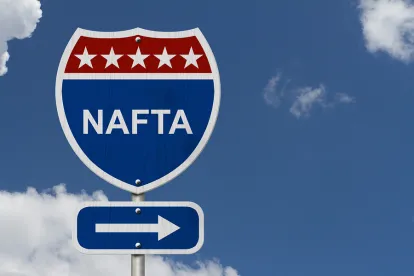Since the enactment of the North American Free Trade Agreement (NAFTA), Mexican customs authorities have had the ability to conduct verifications to confirm the NAFTA origin of goods imported into Mexico (NAFTA origin audits). As the years have passed, however, verifications have become more frequent and sophisticated as to the information and documents authorities expect to receive as evidence to maintain preferential admission into the country.
NAFTA origin audits are usually conducted by requesting that an exporter or producer of the goods provide evidence through: (i) written questionnaires; (ii) visits to their premises; or (iii) written requests for particular information or documents.
In recent years, we have witnessed not only an increase in NAFTA origin audits performed by Mexican customs authorities on U.S. and Canadian exporting companies, but also a new focus on industries that in the past were considered “untouchable” because of their significant participation in Mexico´s growing exportations, such as the automotive and auto parts industries.
I believe the reason for such an increase is that producers or exporters in NAFTA countries usually fail to demonstrate the origin of a product imported into Mexico with NAFTA preferential tariff treatment and, as a consequence, importers are easily assessed with omitted duties and other related taxes. Please note that it is the importers that are hit with the penalties and not the foreign producers or exporters, who may then receive commercial complaints from their buyer-importers.
It is worth mentioning that NAFTA, as with all negotiated free trade agreements, seeks the elimination of tariffs on trade between the parties. That goal is achieved either through full exemption or a reduction of tariffs. When preferential tariff treatment is challenged by the authorities, it is exclusively confirmed when they receive sufficient evidence to verify that products entering their countries from other countries within the Free Trade Region comply with certain rules that demonstrate the products’ origin(such rules are known as General and Specific Rules of Origin).
Rules of Origin can be considered either easy or complex, depending on whether a product is wholly obtained in a NAFTA country or results from a production process that integrates materials originating in the region with others imported from outside the region.
NAFTA obligates an importer to have, at the moment of importation, a certificate of origin issued by the exporter or producer of the goods demonstrating their NAFTA origin. There is a specific format established in NAFTA for certificates of origin.
An exporter or producer that completes and signs a NAFTA certificate of origin is obliged to maintain in its territory, for at least five years after the date at which the certificate was signed, all records related to the production and origin of a good for which preferential tariff treatment was claimed by an importer into the territory of another party.
Records to be kept by exporters or producers that are ordinarily requested by the Mexican customs authorities when conducting a NAFTA origin audit include evidence associated with: (i) the purchase, cost, value, and payment of the product being exported; and (ii) all materials, including indirect materials, used in the production of the exported product; (iii) the production of the good; and (iv) compliance with the applicable rule of origin.
In my experience, when conducting NAFTA origin audits, Mexican customs authorities will only confirm that a particular product is NAFTA originating if exporters or producers produce evidence demonstrating not only the source of the materials used in the production process and compliance with the rule of origin, but also that the specific materials purchased from a particular supplier with certain characteristics and price were the ones incorporated into the products exported to Mexico for which a preferential tariff treatment was claimed.
Therefore, Mexican customs authorities expect to receive not just records and documents pertaining to the purchase of materials and the sale of the finished product to an importer in Mexico, but also records pertaining to the inventory of materials, purchase orders (POs) of Mexican importers, production orders related to such POs, including consumption reports of the materials, production costs, and a detailed explanation of the production process and compliance with the applicable rule of origin.
Consequently, U.S. and Canadian exporters or producers that are audited by Mexican customs authorities for NAFTA origin purposes must take care not only to keep all of the above mentioned records, but also to timely deliver them upon request (which is usually issued in Spanish) and to provide any additional details and comprehensive explanations that will demonstrate the origin of the products imported into Mexico with preferential tariff treatment.




 />i
/>i

